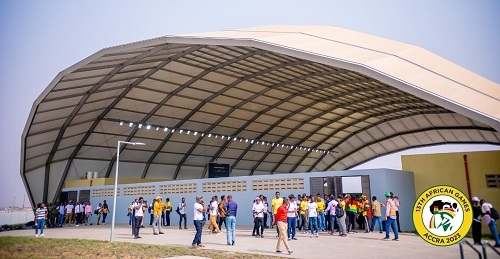
Ensuring lasting legacy for the African Games: Importance of effective facility management
When President Nana Addo Dankwa Akufo-Addo inaugurated the Borteyman Sports Complex, one of the venues designated for the 13th African Games, it set the country in the mood for the continent's biggest sporting extravaganza scheduled for March 8 to 24.
Last Tuesday's ceremony was the clearest indicator of Ghana's readiness to host what is often referred to as Africa's version of the Olympic Games, which will turn Accra into the continent's sporting capital with an estimated 5,000 elite athletes and 3,000 officials expected in the country next month to compete for honours.
A first-class facility, which boasts an aquatic centre with a 10-lane swimming pool, two indoor sports halls and a tennis court, among, others will be at the heart of the action and host more than 10 sporting disciplines during the games.
In addition to the University of Ghana Stadium, the Achimota Cricket Oval and other selected venues, they represent a massive boost in modern sporting infrastructure whose value transcends the African Games.
With an investment of $194 million despite economic challenges, the Ghanaian government has demonstrated its commitment to ensuring the success of the 13th African Games (Accra 2023).
Expectations are understandably high, not only from Ghanaians, but also from the international sporting community, as Ghana strives to set new benchmarks in organisation and performance as some of the competitions are qualifiers for the summer Olympic Games in Paris later in the year.
Having set high standards in sport and a leader in the Pan-African movement, President Akufo-Addo recognises the significance of this event to the country and has entrusted the Local Organising Committee, led by Dr Kweku Ofosu-Asare, with the task of delivering an exceptional African Games.
Similarly, Ghanaians, who have been starved of sporting success will nonetheless have high expectations of Ghanaian athletes to compete favourably for a share of the medal haul with giants such as Nigeria, Kenya, South Africa, Egypt and others.
However, beyond the thrill of competition and the pursuit of medals, hosting the African Games holds immense economic and social value for Ghana.
The country has significantly increased it's stock of modern infrastructure to drive the development of sports but also has other socio-economic benefits, with Ghana set to attract a global audience of about 2.2 billion via traditional television and social media.
Major sporting events such as the African Games provide a platform for host nations to showcase their capabilities and attract global attention.
The influx of athletes, officials, media and fans from across the continent and the associated spending during the period will boost tourism revenues and stimulate various sectors of the economy, including hospitality, transportation and retail.
However, the success of the African Games hinges not only on the event itself but also on the effective management of the infrastructure built for it.
During the inauguration of the Borteyman facility, President Akufo-Addo stressed that the government was committed to investing more in sporting facilities across the country and highlighted the construction of 10 regional stadiums at various stages of completion, in addition to 100 Astroturf football parks to be constructed this year.
After the African Games, the government plans to use the Borteyman facility as a centre of excellence for nurturing talents and as a platform for hosting major competitions as part of larger plans to turn it into a University of Sports Development.
Laudable as the plans seem, the government must ensure that adequate measures are taken to ensure that the body tasked with managing these facilities is up to the task of preventing them from becoming white elephants and wasteful investments.
The sorry state of the Essipon Stadium, left to deteriorate and shut down awaiting massive rehabilitation, as well as the challenges the state faces in maintaining the national stadia in Accra, Kumasi and Tamale, are stark reminders of the importance of post-event planning and the failed legacy of the 2008 Africa Cup of Nations, which saw the government invest over $200 million in infrastructure which has been poorly managed by the National Sports Authority.
The Daily Graphic is, therefore, urging the government to implement a comprehensive facility management policy to ensure that these investments do not become white elephants.
The government must prioritise this issue by ensuring that an organisation with experienced officials outside the NSA is set and entrusted with the task of managing these facilities efficiently to ensure that the benefits of hosting the 13th African Games extend far beyond the event itself, leaving a lasting impact on the country's sporting landscape and socio-economic development.
